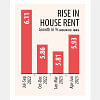House Rent Control: HC verdict ineffective

The landmark High Court verdict delivered in 2015 to prevent owners from arbitrarily raising house rents and collecting excess rents from tenants has become ineffective as its full text could not be released due to death of the judge presiding the relevant bench.
Now there must be a rehearing on the relevant writ petition to get the full text released and make the verdict effective, said petitioner’s lawyer advocate Manzill Murshid.
The HC bench led by Justice Syed Refaat Ahmed has been assigned to rehear the petition, filed as a public interest litigation in April 2010 seeking directives over strict enforcement of the House Rent Control Act, the lawyer told this paper on May 6.
“The bench earlier could not start hearing the writ petition as it lied at the bottom of the cause-list. I will pray to the bench next month to start the hearing,” he added.
Advocate Manzill said Justice Md Abdul Wahhab Miah, who was performing functions of the chief justice, assigned the HC bench led by Justice Refaat in January last year.
Justice Wahhab made the move as Justice Mohammad Bazlur Rahman, who had earlier heard the petition and delivered the verdict, passed away on January 1, 2017.
Justice Bazlur Rahman, who had been promoted as a judge of the Appellate Division, could not complete writing the full judgment.
After Justice Bazlur died, the then chief justice Surendra Kumar Sinha assigned Justice Md Salim to write the judgment of the writ petition. Sinha went abroad on October 13, 2017 and sent a resignation letter to the president on November 10 that year.
After examining the case dossier, Justice Salim had sent the relevant documents to Justice Wahhab and insisted that the writing of the judgment cannot be completed without rehearing the arguments, said advocate Murshid.
In reply to a query, he said, the verdict delivered by Justice Bazlur-led HC bench in an open court was ineffective now. People have to wait for a fresh verdict which would come following a rehearing of the petition.
Human Rights and Peace for Bangladesh (HRPB) filed the writ petition on April 25, 2010, seeking directives for the government to properly enforce the House Rent Control Act, 1991.
The act prevents house owners in the capital from collecting excessive rents and advance.
The rights organisation said most of the tenants were harassed by landlords who defy the rules of the law.
Following the petition, the HC on May 17, 2010 issued a rule asking the government to explain why it should not be directed to enforce the law properly.
During a hearing of the rule in April 2013, advocate Manzill appealed to the HC to direct the government to ensure that house rents are transacted through banks and mobile courts settle disputes over rents.
He argued that house owners in the capital arbitrarily increase rents and evict tenants without notice, defying the law.
On July 1, 2015, the HC bench of Justice Mohammad Bazlur Rahman and Justice Md Ruhul Quddus delivered the verdict on the writ petition, directing the police to accept tenants’ complaints against house owners in all cities, and take immediate steps to protect them if they are forcibly evicted or their gas, water, and electricity lines were disconnected illegally.
It ordered the government to form a seven-member commission within six months to fix the minimum and maximum house rents based on areas and identify the reasons behind disputes between owners and tenants.
The bench also asked the government to appoint a rent controller at every ward in the cities, subject to the government’s financial ability, for resolving disputes over house rent until the commission places recommendations to the authorities concerned.
The HC bench had ruled that the high-powered commission led by a legal expert nominated by the law ministry would give suggestions for resolving problems regarding house rents.
It had said the commission would record statements of tenants and homeowners and hold mass hearings, if necessary, and then make recommendations for reforming the House Rent Control Act to turn it into a comprehensive law.
The HC bench had hoped that the government would amend the existing law in light of the commission’s recommendations.
The six other members of the commission would be a university teacher, an expert on housing and urban issues; a distinguished economist; a senior official of the housing and public works ministry; an expert on consumer rights; a representative of the civil society; and a city corporation official nominated by the LGRD ministry.

 For all latest news, follow The Daily Star's Google News channel.
For all latest news, follow The Daily Star's Google News channel. 







Comments